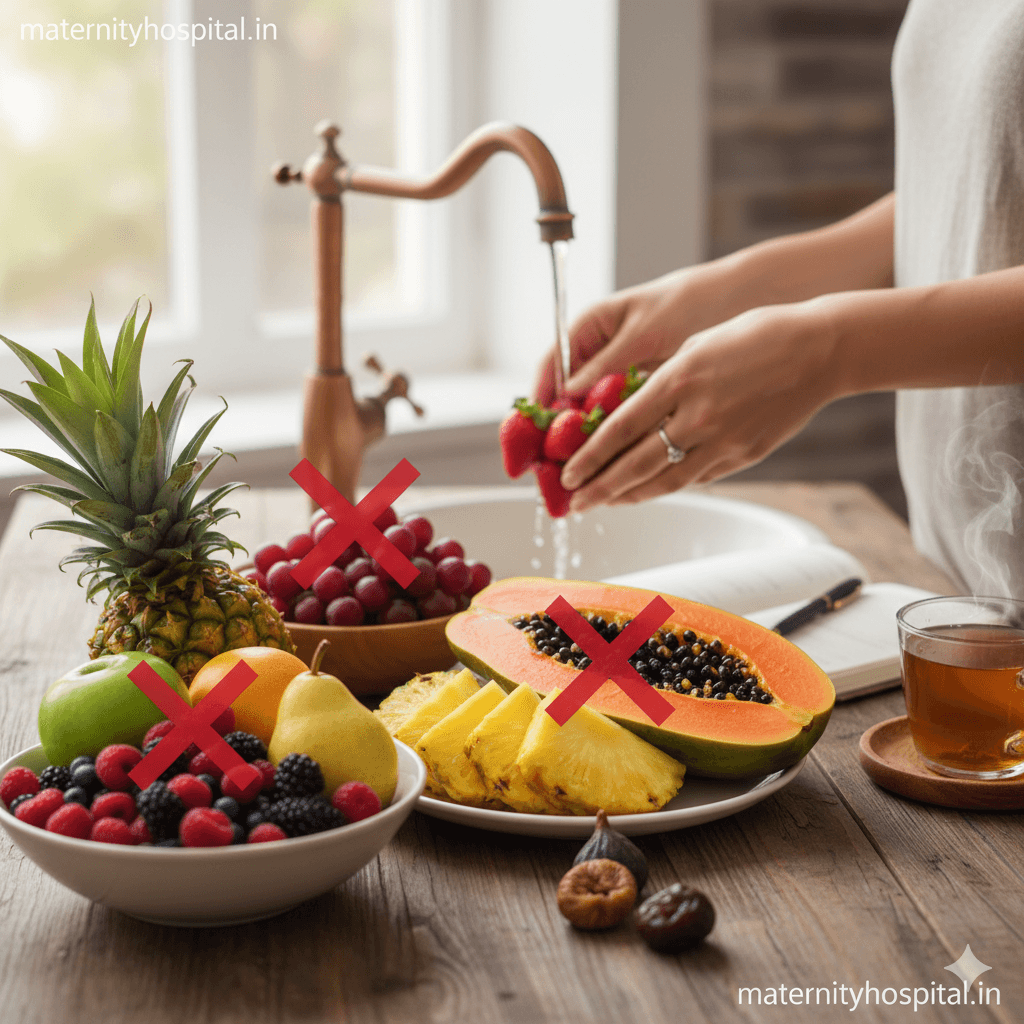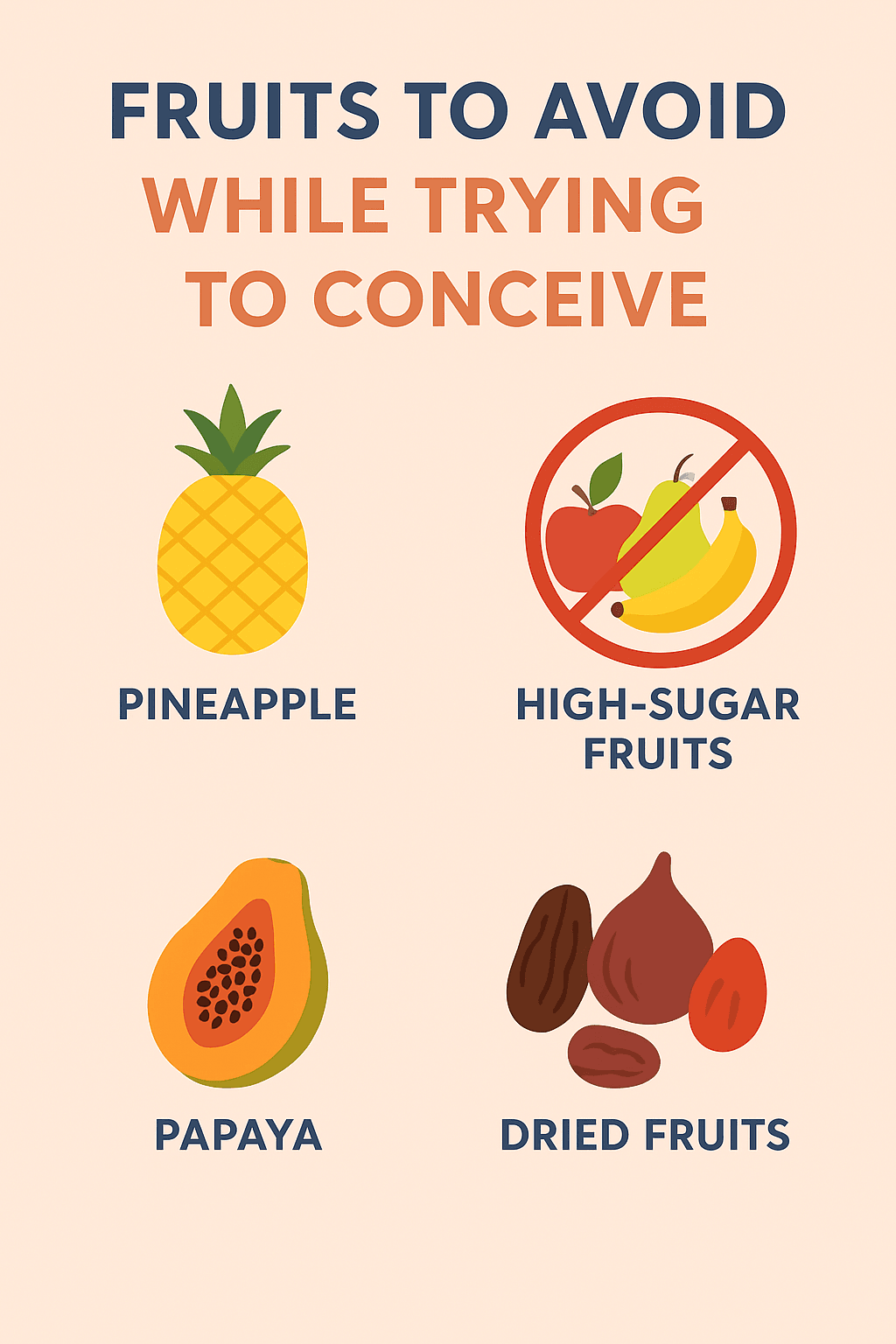
4 Fruits to Avoid While Trying to Conceive (TTC)
Introduction –Nurturing the Body for Conception
The journey to parenthood is often one filled with hope, planning, and meticulous attention to health and lifestyle. For couples trying to conceive (TTC), diet plays a critical, foundational role. A well-balanced, nutrient-rich diet can optimize hormonal balance, improve egg and sperm quality, and prepare the uterine environment for a successful pregnancy. While fruits are universally recognized as cornerstones of a healthy diet, brimming with essential vitamins, antioxidants, and fiber, the preconception phase sometimes requires a nuanced approach, leading to the necessary discussion about fruits to avoid while trying to conceive. It’s a time when traditional wisdom, like that found in Ayurveda, intersects with modern nutritional science, occasionally advising caution against certain foods, including specific fruits, due to their potential effects on the delicate reproductive system.
This comprehensive guide will delve into the specific fruits often advised to limit or avoid when TTC, exploring the traditional, particularly Ayurvedic, perspective alongside any available scientific rationale. We will also touch upon the heightened importance of fruit safety and preparation during this time and, critically, how the consumption of these fruits might affect an established pregnancy. Understanding these dietary caveats is not about restriction, but about making informed choices to create the most fertile Rutu (favorable time/season) and Kshetra (healthy reproductive system), as per Ayurvedic philosophy, for the Beeja (healthy seed/gametes) to flourish. The goal is a prudent diet that fosters the optimal conditions for conception, without sacrificing the joy and nutrition that fruits can provide in moderation.
The Tropical Caution –Papaya and Pineapple

Two tropical fruits frequently top the list of those to approach with caution during the TTC phase, and especially early pregnancy: Papaya and Pineapple. The concerns around these fruits are rooted in long-standing traditional beliefs and are partially supported by pharmacological properties found in their unripe forms.
Papaya: The Unripe Risk
Unripe or semi-ripe papaya is the primary culprit to avoid. The key compound of concern is latex, a milky-white fluid present in high concentrations in the skin and unripe flesh. This papaya latex is known to contain papain, an enzyme that, in significant amounts, has been linked to potential uterine contractions. While the risk from consuming small amounts of fully ripe papaya is generally considered low, the traditional and clinical advice leans toward complete avoidance of unripe or semi-ripe fruit, and often, the whole fruit during the early, critical stages of conception and implantation. From an Ayurvedic perspective, unripe papaya is considered Tikshna (sharp/penetrating) and Ushna (heating), qualities that can potentially aggravate the Pitta and Vata doshas and disturb the delicate balance of the reproductive dhatu (tissue). If consumption occurs in the post-conception phase, this potential for uterine stimulation is what elevates the risk of miscarriage or premature labor.
Pineapple: The Bromelain Balance
Pineapple is another fruit with a mixed reputation in the fertility community. The concern centers on the enzyme bromelain. Anecdotal advice often suggests that consuming large quantities of pineapple, particularly the core, around the time of implantation (the few days after ovulation) should be avoided. Bromelain has been associated with properties that can increase menstrual flow and, theoretically, could contribute to uterine irritability. However, modern scientific literature suggests that the amount of bromelain in a typical serving of pineapple is minimal and highly unlikely to trigger contractions or negatively impact implantation when consumed in moderation as part of a normal diet. The enzyme is largely broken down by the digestive system before it can have a systemic effect. Despite this, the long-held caution persists. Ayurvedic texts sometimes categorize pineapple as slightly Ushna (heating) and acidic, suggesting that excessive consumption could lead to excess Pitta in the body, which might be seen as counter-productive to the nourishing and cooling environment ideally sought for conception. Like papaya, if large amounts were consumed during early pregnancy, the theoretical risk of uterine changes, while low, is the basis for the widespread caution.
The Heat and Sugar Debate – Grapes and High-Glycemic Fruits
Beyond the unique enzyme concerns of the tropical fruits, other fruits are sometimes flagged for avoidance or strict moderation due to their perceived thermal effects on the body or their high sugar content.
Grapes: The ‘Heating’ Effect and Resveratrol
Grapes are often cited in traditional systems, including Ayurveda, as a fruit to limit while fruits to avoid while trying to conceive or during pregnancy, particularly in the later trimesters, due to their tendency to generate heat in the body. According to Ayurvedic principles, excess Ushta Virya (heating potency) can disrupt the balanced environment needed for Shukra Dhatu (reproductive tissue) health and embryo development. Though grapes are rich in beneficial antioxidants, the concern revolves around excessive consumption leading to an imbalance. Furthermore, some studies have focused on resveratrol, a potent antioxidant found in grape skin (especially red/purple grapes). While resveratrol is beneficial in many contexts, certain animal studies have raised theoretical concerns about its effect on fetal development when consumed in extremely high doses. In the absence of definitive human data and given the commonality of the fruit, most modern advice recommends moderation. The key takeaway is to avoid overconsumption and rely on varied, seasonal fruits, rather than eliminating grapes entirely.
High-Sugar Fruits: Balancing Blood Sugar and Hormones
A more contemporary concern revolves around fruits with a high glycemic index (GI) or high sugar content. When fruits to avoid while trying to conceive, maintaining stable blood sugar and insulin levels is crucial, as insulin resistance can negatively impact hormonal balance and ovulation (a key factor in conditions like Polycystic Ovary Syndrome – PCOS). While the natural sugar in whole fruits is coupled with beneficial fiber and nutrients, fruits like very ripe bananas, mangoes, figs, and dried fruits (dates, raisins) have a higher concentration of sugars and can potentially cause a quicker spike in blood sugar compared to lower-GI fruits like berries or apples.
Official External Link on Fruits to Avoid While Trying to Conceive.
- FDA Food Safety Guidelines for Washing Produce: Selecting and Serving Produce Safely
Limiting high-sugar fruits is particularly important for individuals managing pre-existing conditions like diabetes or PCOS. The guidance here isn’t to avoid but to practice strict moderation and pair these fruits with healthy fats or proteins (like a handful of nuts) to slow down sugar absorption, thereby mitigating hormonal disruption. This principle aligns with Ayurveda’s focus on balanced Agni (digestive fire) and avoiding excessive Madhura Rasa (sweet taste) that can lead to Kapha imbalance and sluggishness in the system.
Fruit Safety -General Preconception Guidelines
Beyond specific fruit compounds, the general safety and preparation of all fruits become paramount when trying to conceive, a period sometimes referred to as the “fourth trimester” of preventative health.
Pesticide Residues and Endocrine Disruptors
Exposure to environmental toxins and pesticide residues found on non-organic produce is a valid concern. Some pesticides contain endocrine-disrupting chemicals that can potentially interfere with the delicate hormonal milieu necessary for ovulation, conception, and early pregnancy maintenance. While rigorous washing is essential for all produce, prioritizing organically grown fruits, especially those on the “Dirty Dozen” list (fruits with thinner skins), is a prudent dietary strategy when TTC. The goal is to minimize the body’s toxic load (or Ama in Ayurveda) to create a clean, receptive environment.
Listeria and Foodborne Illnesses
Food safety is critical for all individuals, but particularly so for those trying to conceive and pregnant women, as the immune system is slightly altered, making one more susceptible to certain infections. Listeria is a bacteria that can contaminate produce, especially melons (like cut cantaloupe) where the rough rind is cut and the bacteria transferred to the flesh. Listeriosis, while rare, can lead to serious complications, including miscarriage.
Safety Precautions for All Fruits:
- Washing: Thoroughly wash all fresh fruits under running water, even if you plan to peel them.
- Melons: Avoid cut melon that has been sitting at room temperature for an extended period (e.g., in a buffet).
- Bruising: Avoid eating fruits with bruises or soft spots, as these areas can harbor bacteria.
By focusing on these general safety measures, a woman TTC is not only protecting her own health but also proactively shielding the future fetus from potential harm, reinforcing the Ayurvedic principle that a mother’s optimal health (Rasa and Rakta Dhatus—plasma and blood tissues) directly nourishes the reproductive system.
Ayurvedic Perspective –The Doshas and Fruit Selection
Ayurveda offers a holistic framework for a preconception diet, focusing not on blanket exclusions, but on balancing the three doshas (Vata, Pitta, Kapha) and optimizing Shukra Dhatu (reproductive tissue).
Focus on Shukra Dhatu Nourishment
The entire process of conception, according to Ayurveda, depends on the quality of Shukra Dhatu in both partners. The diet should be sattvic (pure, wholesome), rich in Ojas (vitality), and easily digestible. Fruits that are generally recommended are sweet, juicy, and grounding, such as ripe mangoes (in moderation), peaches, pears, and dates/figs (again, in moderation due to sugar content).
Fruits and the Doshas:
- Pitta Imbalance (Excess Heat): If an individual is experiencing excess heat (Pitta aggravation)—symptoms like acidity, inflammation, or irritability—fruits considered Ushna Virya (heating potency) should be limited. This includes unripened mangoes, tamarind, and excessive citrus. Grapes, for their ‘heating’ reputation, may also be limited until balance is achieved.
- Kapha Imbalance (Excess Sluggishness): If Kapha is aggravated (leading to sluggish metabolism, weight gain, or hormonal cysts), very sweet, heavy, or high-sugar fruits might be minimized. The focus shifts to lighter fruits like apples and berries, consumed on their own.
- Vata Imbalance (Excess Dryness/Irregularity): For Vata aggravation (dryness, anxiety, irregular cycles), fruits should be ripe, sweet, and grounding, often paired with a healthy fat like ghee or nuts to aid digestion and lubrication.
Tamarind and Fertility:
Tamarind, while often used to treat morning sickness, is another fruit that is sometimes advised against in large quantities when fruits to avoid while trying to conceive. It is highly acidic and Ushna Virya, which can be seen as aggravating to Pitta. More specifically, traditional texts sometimes link excessive sourness (Amla Rasa) with potential reduction in progesterone levels—a key hormone for maintaining a pregnancy. Therefore, it is typically suggested to be consumed only sparingly, if at all, during the preconception phase.
The Ayurvedic approach is highly personalized. Consulting an Ayurvedic practitioner can provide a customized diet plan that selects specific fruits to pacify the individual’s dominant or imbalanced dosha, rather than relying on a generic ‘avoidance’ list.
Fruits in Established Pregnancy –Continuation of Caution
Once conception is confirmed, the caution surrounding certain fruits in the first trimester, a time of crucial organ development and implantation stability, intensifies, especially for those traditionally associated with uterine effects.
Papaya and Pineapple in Early Pregnancy
The advice to strictly avoid unripe and semi-ripe papaya becomes even more critical in the first trimester and continues throughout the pregnancy. The high concentration of latex and papain in the raw form is considered a true risk factor for inducing uterine contractions and potentially leading to miscarriage. While ripe papaya is generally deemed safe and nutritious, many healthcare providers still recommend total avoidance to eliminate any risk of accidental consumption of a slightly under-ripe piece. Similarly, while the threat from a moderate serving of pineapple is often downplayed by modern doctors, the traditional counsel to limit it, especially in the first trimester due to the bromelain content, is widely followed by many expectant mothers as a precaution against uterine changes.
Grapes and High-Sugar Fruits in Later Pregnancy
As pregnancy progresses, the focus shifts to different concerns. Excessive consumption of grapes in the third trimester is sometimes cautioned against by tradition due to the risk of heat generation that could potentially be harmful. More critically, high-sugar and high-GI fruits, including very sweet grapes, large servings of mango, and dates, need to be monitored closely, especially in the later stages. This is due to the increased risk of Gestational Diabetes (GDM), a condition that can have significant health implications for both mother and baby. While the focus remains on moderation over avoidance, women diagnosed with GDM must work with their healthcare team to manage carbohydrate and sugar intake, which may necessitate limiting these sweeter fruit choices.
Foodborne Illness Risks are Paramount
The food safety considerations (washing, avoiding unpasteurized juices, careful storage of cut fruits) remain absolutely paramount throughout all three trimesters. The risks associated with infections like Listeriosis are severe, making diligence in fruit preparation a non-negotiable part of the pregnancy diet.
Frequently Asked Questions(FAQs) on fruits to avoid while trying to conceive
Q1: Can I eat any pineapple while trying to conceive (fruits to avoid while trying to conceive)? A: Yes, you can generally eat pineapple in moderation. The concern about the enzyme bromelain triggering uterine contractions is primarily anecdotal and based on consuming very large amounts, which is generally considered safe. However, many choose to limit it only during the few days immediately following ovulation as a precautionary measure during the critical implantation window.
Q2: Is ripe papaya safe to eat when TTC? A: While fully ripe papaya is rich in vitamins and fiber, the general advice from many traditional and modern sources leans towards complete avoidance, especially during the TTC and early pregnancy phases. This is due to the difficulty in discerning whether a papaya is fully ripe and the high risk associated with the latex and papain in unripe/semi-ripe fruit. It’s often safer to substitute with other nutrient-rich fruits.
Q3: Why does Ayurveda suggest avoiding certain fruits due to “heat”? A: In Ayurveda, the concept of Ushna Virya (heating potency) suggests that certain foods can increase the Pitta dosha (fire element). For conception, a calm, cool, and nourished uterine environment is preferred. Excess Pitta is believed to potentially create an overly acidic or imbalanced internal environment, which may hinder the process of conception and implantation.
Q4: Should I completely stop eating high-sugar fruits like mangoes and dates? A: No, complete cessation is usually unnecessary. The recommendation is for moderation. These fruits are nutrient-dense, but their high sugar content can cause blood sugar spikes, potentially disrupting hormonal balance, especially if you have conditions like PCOS or a family history of diabetes. It’s best to eat them in smaller portions and pair them with a protein or healthy fat to slow sugar absorption.
Q5: What is the most important fruit safety rule when trying to conceive? A: The most critical rule is to thoroughly wash all fresh fruits before consumption. This minimizes the risk of consuming harmful bacteria like Listeria and reduces exposure to pesticide residues, which can potentially act as endocrine disruptors.
Conclusion –Prudent Choices for Optimal Fertility
The journey of trying to conceive is a holistic endeavor, and diet is a powerful tool in preparing the body for the immense task of gestation. While fruits are undeniably vital sources of fertility-boosting nutrients, antioxidants, and fiber, a prudent and informed approach is warranted. The fruits most frequently cited for limitation or avoidance—unripe papaya, pineapple (in excess), and very high-sugar fruits—are based on a blend of traditional wisdom (Ayurveda’s focus on Ushna Virya and Pitta balance) and concerns about pharmacological activity (latex/papain, bromelain) and metabolic impact (blood sugar spikes).
The overarching principle should be moderation, variety, and safety. Rather than eliminating entire categories of food, the goal is to favor a diverse intake of fresh, seasonal, thoroughly washed, and (where possible) organic fruits, while consciously minimizing the intake of those that carry a theoretical or traditional risk, especially around the crucial window of ovulation and implantation. By embracing an informed preconception diet, individuals are actively nurturing the best possible environment—the Kshetra—for a healthy conception and pregnancy. Always consult with a healthcare provider or a fertility-specialized nutritionist for personalized dietary advice tailored to individual health history and specific needs.










